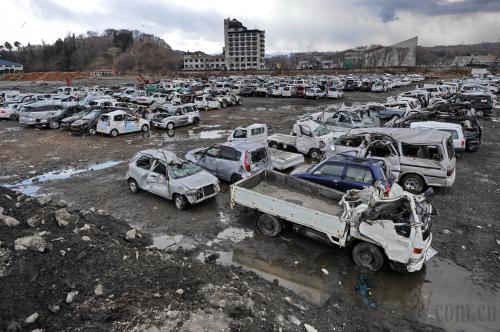|
 |
|
RIPPLE EFFECT: Damaged cars and trucks destroyed in the recent earthquake and tsunami are placed in a scrapyard at the port of Miyako, Iwate Prefecture, on March 27, 2011. The earthquake is expected to deal a blow to the supply chain of the global manufacturing industry (XINHUA/AFP) |
The catastrophic earthquake and ensuing tsunami in Japan have raised concerns about the economic backlash not only to Japan, but also to the world. Standard Chartered Bank's report Japan: Assessing the Impact warned that Japan's economy faces the short-term risk of stagnation and suggested the possible impact the rest of the world could face. Edited excerpt follows:
Right now, it is difficult to assess the economic impact of the March 11 earthquake in northeastern Japan. Assuming the same proportional cost of rebuilding relative to that region's GDP contribution as in the Kobe earthquake of 1995, the cost would be around 1 percent of Japan's GDP, or $60 billion.
While rebuilding costs will add to Japan's government debt, at around 200 percent of GDP, a further 1-percent burden is unlikely to change the country's debt dynamics, especially since not all costs will be borne by the government.
Given the scale of the devastation, the near-term impact on Japan's economy should not be underestimated. That being said, Japan's economy has the ability to cope, and it will rebound.
A V-shaped effect
The immediate impact on Japan may be stagflation: negative for growth, with upward pressure on prices of items in short supply, such as food and reconstruction materials. The scale of the devastation means that the affected region may take years to fully recover. This will not be easy for a country with a rapidly ageing population.
In terms of direct economic losses, we see a limited impact. The impact is not always proportionate to the magnitude of the event, but depends more on where it hits. This event, though a record in seismic history, spared the country's industrial heartland. The four affected prefectures account for around 7 percent of Japan's economy.
The latest emergency at the Fukushima nuclear power plant has become the key unknown in this crisis; in the most benign scenario, it may take weeks for Japan to recover its full supply of energy. Provided that the authorities can successfully contain a nuclear-plant crisis, we now expect most economic activity to take a substantial hit in March and April but to rebound in the following months.
In terms of assessing the damage, this is still a developing situation. While it will take time to assess the full damage, much of what was there has been wiped out completely. This points to a huge reconstruction cost, plus the challenge of repopulating the farming regions. Japanese industrial firms work on low inventories and efficient supply chains, so there's the risk of disruptions to those chains. The biggest challenge for many firms may be power shortages, although this problem is more likely to affect regions away from the industrial centers.
The fears are that energy rationing could continue until the end of April. This, plus damage to supply chains, could hit production even for companies far removed from the scene of the disaster.
Also, confidence is fragile, and there are fears that the situation at the nuclear plant may deteriorate. If so, this could hit confidence further. The negative impact on Japan's domestic confidence could be sizeable.
The impact on growth will invariably be V-shaped. There was a blow to growth, resulting in the downward leg of the V. Output was hit, spending affected and confidence reduced.
While Japan's GDP growth in the first quarter of 2011 could be negative, the ensuing momentum once things normalize, plus reconstruction spending, will likely result in a rebound in the second quarter and support GDP growth in the second half of 2011.
Policy response and the yen
The Bank of Japan has already stepped in to provide liquidity support; we believe it will continue to do so. The policy response has already included the central bank ensuring sufficient liquidity to overcome any near-term problems.
The damage to the economy and further pressure on the government deficit should be negative on the yen. However, the initial market expectation may well be of the yen's appreciation as domestic investors and funds more likely to invest offshore show their patriotism by keeping money at home. Insurers that hold huge amounts of overseas assets may be forced to repatriate to pay for claims and costs as a result of the disaster, even though many see Japan as an underinsured nation in areas such as property. The last thing Japan needs is a stronger currency; the economy will need solid export performance, especially with domestic demand likely to suffer.
The authorities are likely to intervene to ensure the yen's stability. The main focus, though, is likely to be on fiscal policy and the cost of the disaster. Japan's recent ratings outlook downgrade by Moody's met with a mixed price response, as its large public debt is accompanied by large private savings. There is no doubt there will be a further temporary increase in debt. But this can be financed, and relative to the debt stock, this is a relatively small burden to absorb. Yields are likely to stay low, especially as the Bank of Japan has the capacity to step up its asset purchase program further.
Global impact
The economic and financial impact of this earthquake will largely be felt in Japan. The impact elsewhere will depend on how the disaster impacts prices of international commodities—particularly given recent food price increases and energy inflation.
| 